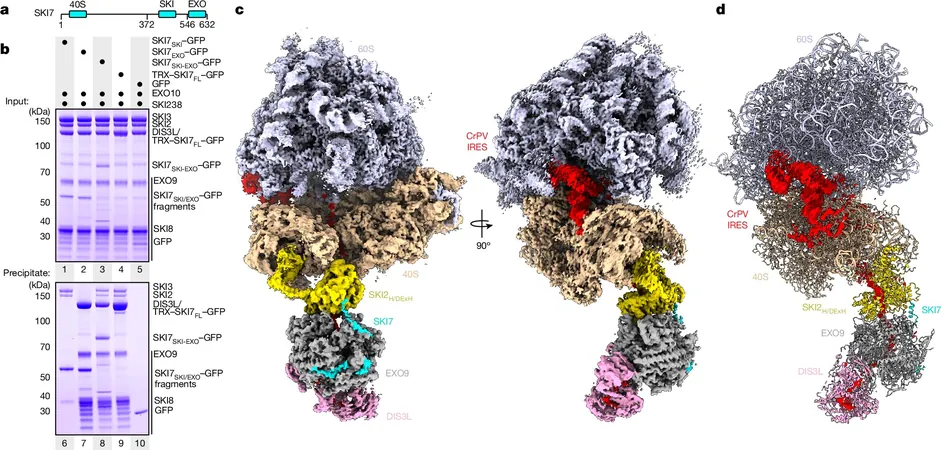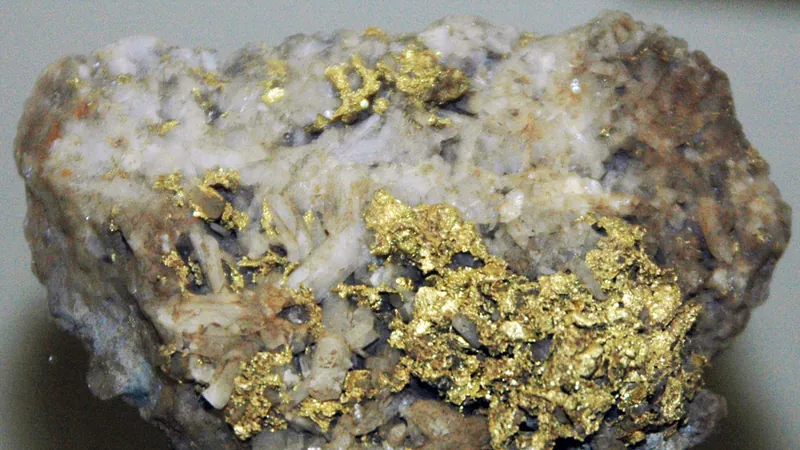
Breaking Discovery: Scientists Uncover the Hidden Connection Between mRNA Translation and Decay!
2024-10-10
Author: Rajesh
Introduction
Messenger RNA (mRNA) is essential for building proteins within cells, acting as a blueprint that guides the process of translation. Yet, when mRNA becomes obsolete or defective, it must be efficiently degraded, a vital process to maintain cellular health. In a groundbreaking study conducted by director Elena Conti and her team at the Max Planck Institute of Biochemistry in Martinsried, Germany, a novel supercomplex has been unveiled that links the translation and decay processes of mRNA.
Key Findings
Published in the prestigious journal *Nature*, the study reveals how three significant protein complexes—the ribosome, the SKI complex, and the exosome—interact to form this supercomplex. Previously known for their individual roles, the ribosome synthesizes proteins by translating mRNA into amino acid sequences, while the exosome functions as a "molecular shredder," breaking down unwanted mRNA. The SKI complex acts as a carrier, directing mRNA to the exosome when it is no longer needed.
Research Methodology
The research team delved into the intricacies of this interaction, testing if these complexes work in isolation or if they could be coordinated during mRNA degradation. Their previous findings indicated a close collaboration between the SKI complex and the exosome, which set the stage for further exploration.
Advanced Techniques
Utilizing advanced high-resolution microscopy techniques, researchers Alexander Kögel and Achim Keidel have confirmed that all three protein complexes unite to form a stable supercomplex, particularly in circumstances where mRNA is damaged. Under normal conditions, multiple ribosomes translate a single mRNA strand. However, in the presence of defective mRNA, collisions between ribosomes can occur. This scenario captivates researchers as it serves as a trigger for the SKI complex to engage and initiate the degradation of the faulty mRNA.
Quality Control Mechanism
The team's findings draw an intriguing parallel to a quality control system in a manufacturing process: when the SKI complex detects an error, it attaches to the ribosome, unwinding the mRNA into a linear strand. With the aid of another crucial protein, SKI7, the SKI complex facilitates the transfer of the mRNA to the exosome for degradation.
Implications and Future Directions
This groundbreaking research not only sheds light on the complex interplay between translation and degradation of mRNA but also enhances our understanding of cellular quality control mechanisms. As scientists uncover the molecular choreography behind these processes, it opens new avenues for potential therapeutic interventions in diseases where mRNA degradation pathways are disrupted.
Conclusion
Stay tuned as we uncover more insights from this remarkable study and its implications for cellular biology and medicine!



 Brasil (PT)
Brasil (PT)
 Canada (EN)
Canada (EN)
 Chile (ES)
Chile (ES)
 España (ES)
España (ES)
 France (FR)
France (FR)
 Hong Kong (EN)
Hong Kong (EN)
 Italia (IT)
Italia (IT)
 日本 (JA)
日本 (JA)
 Magyarország (HU)
Magyarország (HU)
 Norge (NO)
Norge (NO)
 Polska (PL)
Polska (PL)
 Schweiz (DE)
Schweiz (DE)
 Singapore (EN)
Singapore (EN)
 Sverige (SV)
Sverige (SV)
 Suomi (FI)
Suomi (FI)
 Türkiye (TR)
Türkiye (TR)